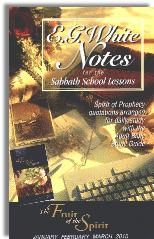|
||||||||||||||
Commentary on "The Fruit of the Spirit is Patience"
Day 6: Thursday, January 28, 2010
Overview
The heading for Thursday's study is "How to Develop Patience".
"My brethren, count it all joy when you fall into various trials, knowing that the testing of your faith produces patience. But let patience have its perfect work, that you may be perfect and complete, lacking nothing" (James 1: 2-4 NKJB).
The author defines the Greek word for "trials" as peirazo, which is actually used in a different context later in James, not in James 1:2-4. The author is somewhat confusing when he cites James 1:2-4 which talks of trials, but then blurs this with an idea of temptation to do evil. A quote from Ellen White is given from the book, "Thoughts from the Mount of Blessing", pg. 10. According to the author trials are used to produce God's character in us.
Observations
O'fill incorrectly interprets and connects James 1:2-4 to temptations. And according to O'fill temptations are allowed in our lives to produce God's character in us.
"Consider it all joy, my brethren, when you encounter various trials, knowing that the testing of your faith produces endurance. And let endurance have its perfect result, so that you may be perfect and complete, lacking in nothing" (James 1:2-4; NASB).
The Greek word in James 1:2-4 used for trials is pirasmos, a form of peirazo. Pirasmos means putting to proof by experiment or adversity. This fits the first part of James where it talks about asking God for wisdom. In other words, James implies we should ask God for wisdom when we are in the midst of trials. This is quite different then a temptation to do evil in which we need God's power to resist.
James is referring to a "testing" of our faith not our character. Faith denotes a trust in God's sovereignty during trials. The Greek word for faith in this James passage is pistis. Pistis refers to the truthfulness of God or reliance upon Christ for salvation. We can mistrust God's faithfulness in trials. Yet, James is encouraging the believer that God is faithful to His promises.
O'fill blurs the lines between a testing of one's faith and temptation by quoting from Ellen White. The first part of the quote reads, "The trials of life are God's workmen, to remove the impurities and roughness from our character." This is a total disconnect from the James 1:2-4 passage. According to the Adventist worldview Ellen White is implying that God uses trials to help build our character and ultimately help us behave better.
James on the other hand is referring to a steadfastness of faith, a life of trusting in God amidst troubles and afflictions.
O'fill references 1 Peter 5:8 passage, "Be of sober spirit, be on the alert Your adversary, the devil, prowls around like a roaring lion, seeking someone to devour" (NASB). O'fill then writes, "What this does mean, however, is that through a complete surrender of ourselves to the Lord, to grasping hold of Him in faith and obedience, no matter what we go through, we can come out better or more refined if we allow God to work in us." What O'fill blurs the lines between a testing of faith and a temptation to sin and doesn't recognize that faith is a gift from God not something we manufacture.
For by grace you have been saved through faith; and that not of yourselves, it is the gift of God; not as a result of works, so that no one may boast.
Even the faith to believe is a gift.
O'fill closes by quoting Phil. 1:6 (KJV), "Being confident of this very thing, that he which hath begun a good work in you will perform it until the day of Jesus Christ." By placing this quote at the end of this section O'fill leads the reader to believe we allow "God to work in us" so that we can do good things.
A more accurate translation of Phil. 1:6 reads, "For I am confident of this very thing, that He who began a good work in you will perfect it until the day of Christ Jesus" (NASB). The ESV version reads complete it until the day of Christ Jesus.
It is important to note that Paul is talking about the gospel and the power of Christ to save and sanctify. The ESV study notes read, "Genuine spiritual progress is rooted in what God has done, is doing, and will do." The work of salvation is Christ's and so is the work of fruit bearing.
Summary
- James 1: 2-4 speaks of a testing of one's faith during trials.
- James 1:2–4 does not refer to a temptation to sin.
- Trials are not about producing "goodness" in our "characters".
- James is referring to trusting God in the midst of trails and difficulties.
- Faith to believe is a gift from God.
- The work of salvation is Christ's and so is the work of fruit bearing.
GO TO DAY 7
Copyright 2010 BibleStudiesForAdventists.com. All rights reserved. Revised January 27, 2010. This website is published by Life Assurance Ministries, Glendale, Arizona, USA, the publisher of Proclamation! Magazine. Contact email: BibleStudiesForAdventists@gmail.com.
The Sabbath School Bible Study Guide and the corresponding E.G. White Notes are published by Pacific Press Publishing Association, which is owned and operated by the Seventh-day Adventist church. The current quarter's editions are pictured above.
Official Adventist Resources
Standard Edition Study Guide Week 5
Teacher's Edition Study Guide Week 5
Easy Reading Edition Study Guide Week 5
Search the Complete Published Ellen G. White Writings


